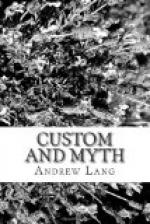Sir Henry Maine opposes to Mr. M’Lennan’s theory the statement of Mr. Darwin: ’From all we know of the passions of all male quadrupeds, promiscuous intercourse in a state of Nature is highly improbable.’ {248} On this first question, let us grant to Sir Henry Maine, to Mr. Darwin, and to common sense that if the very earliest men were extremely animal in character, their unions while they lasted were probably monogamous or polygamous. The sexual jealousy of the male would secure that result, as it does among many other animals. Let the first point, then, be scored to Sir Henry Maine: let it be granted that if man was created perfect, he lived in the monogamous family before the Fall: and that, if he was evolved as an animal, the unchecked animal instincts would make for monogamy or patriarchal polygamy in the strictly primitive family.
(2.) Did circumstances and customs ever or anywhere compel or induce man (whatever his original condition) to resort to practices which made paternity uncertain, and so caused the absence of the patriarchal family, kinship being reckoned through women? If this question be answered in the affirmative, and if the sphere of action of the various causes be made wide enough, it will not matter much to Mr. M’Lennan’s theory whether the strictly primitive family was patriarchal or not. If there occurred a fall from the primitive family, and if that fall was extremely general, affecting even the Aryan race, Mr. M’Lennan’s adherents will be amply satisfied. Their object is to show that the family, even in the Aryan race, was developed through a stage of loose savage connections. If that can be shown, they do not care much about primitive man properly so called. Sir Henry Maine admits, as a matter of fact, that among certain races, in certain districts, circumstances have overridden the sexual jealousy which secures the recognition of male parentage. Where women have been few, and where poverty has been great, jealousy has been suppressed, even in the Venice of the eighteenth century. Sir H. Maine says, ‘The usage’ (that of polyandry—many husbands to a single wife) ’seems to me one which circumstances overpowering morality and decency might at any time call into existence. It is known to have arisen in the native Indian army.’ The question now is, what are the circumstances that overpower morality and decency, and so produce polyandry, with its necessary consequences, when it is a recognised institution—the absence of the patriarchal family, and the recognition of kinship through women? Any circumstances which cause great scarcity of women will conduce to those results. Mr. M’Lennan’s opinion was, that the chief cause of scarcity of women has been the custom of female infanticide—of killing little girls as bouches inutiles. Sir Henry Maine admits that ’the cause assigned by M’Lennan is a vera causa—it is capable of producing the effects.’ {249} Mr. M’Lennan collected a very large mass of testimony




